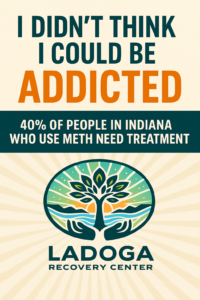I never saw myself as a meth addict. I didn’t look the part. I didn’t live on the street. I didn’t have track marks. I wasn’t “tweaking out” in public. I told myself meth was just how I kept my edge—just a little push to get through work, to lose some weight, to keep up with everything.
The idea that methamphetamine addiction could sneak up on someone like me? That was something I couldn’t wrap my head around—until my body and my mind started breaking in ways I couldn’t ignore.
“I Used Meth, Sure—But I Had It Under Control”
That’s the lie I clung to the longest.
At first, meth made me feel powerful. Focused. It helped me work late, stay awake longer, talk faster, hustle harder. I felt like I had unlocked some kind of cheat code. And when people started asking if I was okay—commenting on the weight loss, the dark circles under my eyes—I just brushed it off. They didn’t get it.
Eventually, I stopped sleeping. I stopped eating. I got paranoid about everything. But I kept using, because stopping felt worse. I told myself I was just burnt out. That I’d slow down “after this week.” That meth wasn’t the problem—I was just stressed. Just tired. Just doing what I had to do.
By the time I realized I was spinning out, I was already in a tailspin.
The Night I Nearly Died
I had been up for three days straight. My heart was pounding so hard I could hear it in my ears. I was sweating and freezing at the same time. I thought I saw bugs crawling across the walls, but when I turned the lights on, they vanished.
I was alone in my apartment. My phone had died. My chest hurt, and my thoughts were racing so fast I couldn’t catch a single one. And for the first time, I was afraid I wouldn’t survive the night.
That was my turning point—not because it was dramatic or cinematic, but because it was quiet and terrifying and very, very real. Meth wasn’t helping me survive anymore. It was actively trying to kill me.
I Thought Treatment Didn’t Work—Because It Didn’t Work The First Time
Before that night, I had already been to treatment once. I walked in full of skepticism. I sat in the groups, listened half-heartedly, made it 30 days sober—and then relapsed the week I got out.
So I told myself: “See? It didn’t work. You’re just broken.”
But now I can say this: It wasn’t that treatment failed me. It’s that I didn’t let it reach me. I was too busy proving to myself that I didn’t belong there. I wasn’t honest. I wasn’t open. I wasn’t ready to look at the full truth of my meth use.
It took almost dying for me to stop trying to manage it on my own.

What Changed When I Tried Again
This time, I didn’t pretend to be fine. I didn’t roll my eyes through group or sit in the back of the room. I went in with one question: “Can I get better, even if I don’t fully believe this will work yet?”
At Ladoga Recovery Center in Indiana, the answer was yes.
No one forced me to be hopeful. They didn’t feed me cheesy slogans. They gave me space to be skeptical and still show up. They let me talk about the shame, the doubt, the fear that I’d never be “normal” again. They reminded me that meth rewires your brain—and it takes real support to unlearn that wiring.
I started to see myself in other people. I started sleeping again. I started remembering who I was before meth took over. And for the first time, I didn’t feel like I was faking my way through recovery. I was actually healing.
You Don’t Have to Fit the Stereotype for Meth to Be Ruining Your Life
I used to think you had to “hit bottom” in a very specific way before you deserved help. But bottom looks different for all of us. Maybe yours is emotional. Maybe it’s mental. Maybe you’re barely holding on, but you’re still holding on—and that’s enough to ask for help.
Methamphetamine addiction doesn’t always look the way you expect. It can wear a hoodie instead of hospital scrubs. It can drive to work. It can have a degree. It can still call its mom.
Don’t let the image in your head keep you from getting help. Meth doesn’t care if you’re high-functioning or barely hanging on. It will still destroy you—quietly, steadily, completely.
And here’s what I learned: You don’t have to let it finish the job.
FAQs About Methamphetamine Addiction and Recovery
Is it possible to recover from meth addiction without going to rehab?
Some people try to quit meth on their own, but it’s extremely difficult and dangerous without medical and emotional support. Meth withdrawal can include depression, fatigue, paranoia, and intense cravings. A structured program like the one at Ladoga Recovery Center can provide the tools, support, and environment needed for real healing.
How do I know if I’m addicted to meth?
If you’ve tried to stop and couldn’t… if your use is affecting your mental health, relationships, or ability to function… if you’re hiding it or lying about it… those are all signs that meth may have a hold on you. You don’t have to wait until you’ve lost everything to call it addiction.
I tried treatment before and it didn’t work—why would this be different?
That’s a fair question. Sometimes the fit wasn’t right. Sometimes we weren’t ready. Sometimes the timing or support level wasn’t enough. At Ladoga Recovery Center, we understand that recovery isn’t one-size-fits-all. We work with you, at your pace, to build something real this time.
What makes Ladoga Recovery Center different?
Ladoga Recovery Center offers personalized, compassionate methamphetamine addiction treatment in Indiana. We don’t expect blind belief—we meet people where they are. If you’ve been burned by treatment before or aren’t sure if you’re ready, we’re ready to talk through it without judgment.
It Doesn’t Have to End Like This
If you’re reading this and wondering if meth might be taking more from you than you realized, you’re not alone. You don’t have to wait for a near-death moment to start over.
Call (844) 628-6202 or learn more about our methamphetamine addiction treatment in Indiana. Ladoga Recovery Center is here when you’re ready—even if you’re not 100% sure yet. That’s okay.

